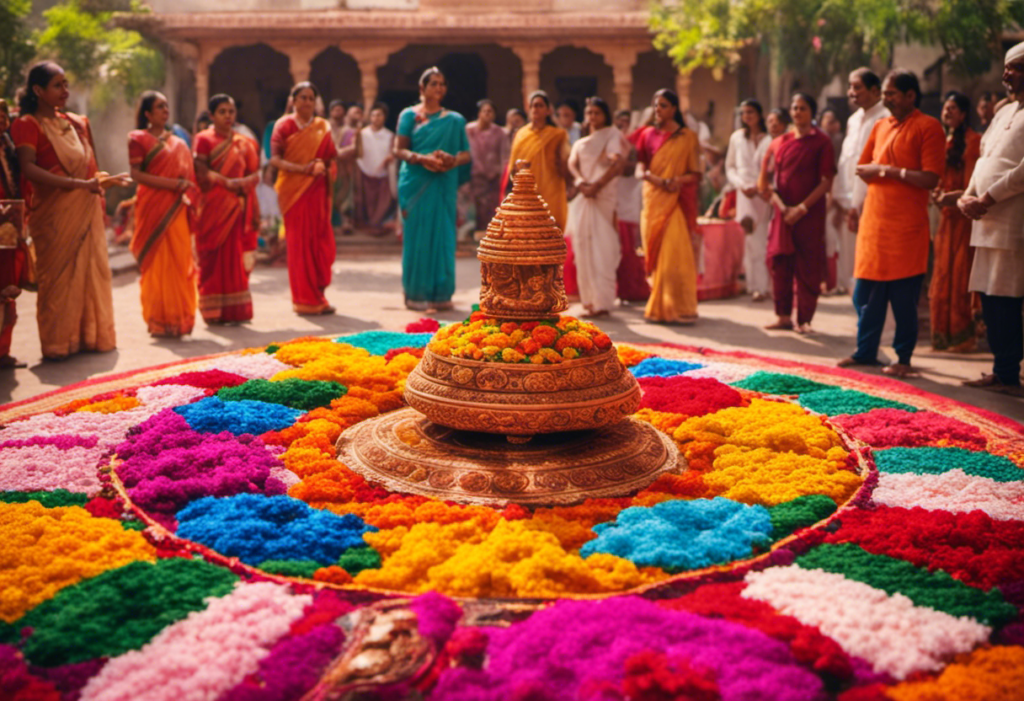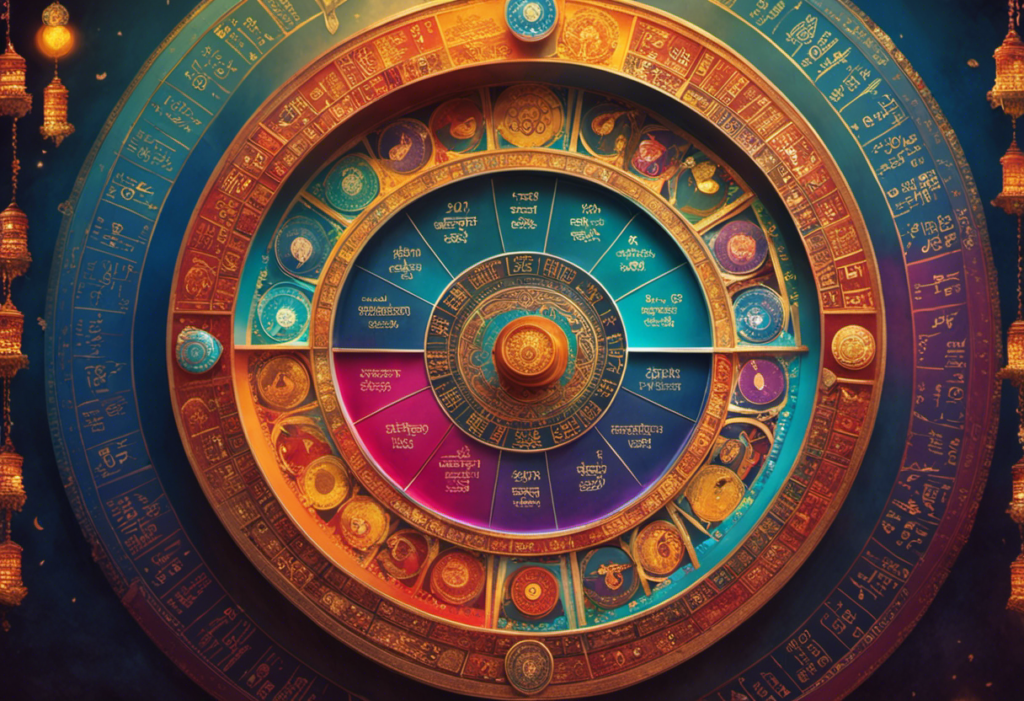According to historical records, Yugadi, the New Year celebration in the Vikram Samvat calendar, holds great significance. With its origins dating back centuries, this annual observance is marked by symbolic rituals and cultural festivities.
Celebrated by Hindu communities worldwide, Yugadi symbolizes a time of personal growth and renewal. In this article, we will explore the multifaceted significance of Yugadi in Vikram Samvat, delving into its historical, cultural, and spiritual aspects, and its impact on individuals seeking rejuvenation and transformation.
Key Takeaways
- Yugadi marks the beginning of the New Year in the Vikram Samvat calendar.
- It is associated with the Satavahana dynasty and the start of a new agricultural cycle.
- Yugadi is a time for reflection, renewal, and devotion in Hinduism.
- It symbolizes new beginnings and the path towards self-discovery and personal growth.
Historical Origins of Yugadi in Vikram Samvat
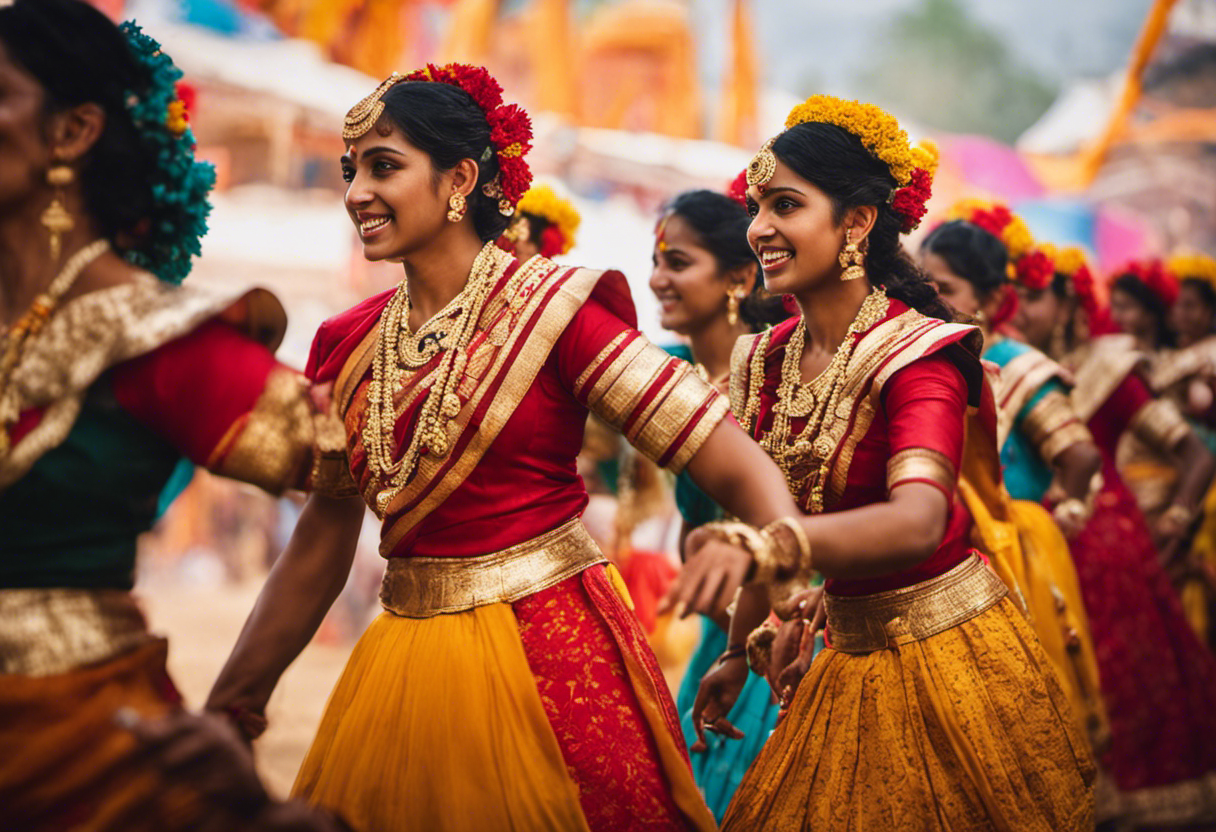

The historical origins of Yugadi in Vikram Samvat can be traced back to ancient Hindu traditions and the lunar calendar system. Vikram Samvat is a calendar system that was established by the legendary Indian king, Vikramaditya, in the 57th century BCE. It is based on the lunar cycles and is widely used in various parts of India, particularly in the states of Gujarat, Maharashtra, and Karnataka.
Yugadi, also known as Ugadi, marks the beginning of the New Year according to the Vikram Samvat calendar. The term ‘Yugadi’ is derived from the Sanskrit words ‘yuga’ meaning era or age, and ‘adi’ meaning the beginning. It signifies the start of a new age or era.
The celebration of Yugadi has deep historical and cultural significance. It is believed to have originated during the reign of the Satavahana dynasty in ancient India. The lunar calendar system was widely used during this period, and Yugadi was celebrated as the first day of the new year. The festival is associated with renewal, prosperity, and the beginning of a new agricultural cycle.
The historical origins of Yugadi in Vikram Samvat highlight the rich cultural heritage of India and the importance of following the lunar calendar system in Hindu traditions. It continues to be celebrated with great enthusiasm and joy, symbolizing hope and new beginnings.
Symbolic Rituals and Traditions of Yugadi
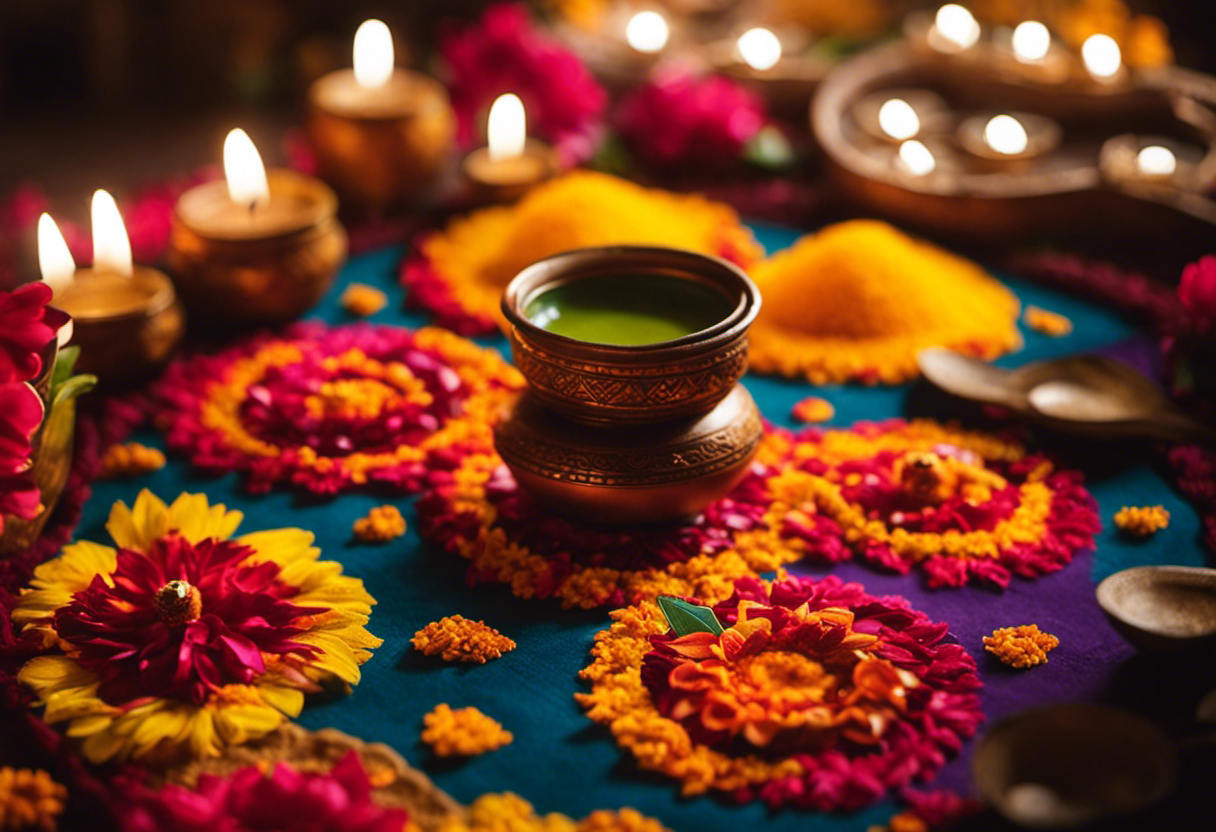

During Yugadi, various symbolic rituals and traditions are observed to commemorate the beginning of the New Year in Vikram Samvat. These rituals and traditions hold deep significance and are believed to bring prosperity and good fortune for the upcoming year.
Here are some of the symbolic traditions associated with Yugadi:
- Ugadi Pachadi: One of the most important traditions is the preparation and consumption of Ugadi Pachadi, a special dish made with six different tastes – sweet, sour, salty, bitter, tangy, and spicy. Each taste represents a different emotion or experience of life, symbolizing the belief that life is a mix of different flavors.
- New Clothes: People traditionally wear new clothes on Yugadi, symbolizing a fresh start and the shedding of old ways. It is believed that wearing new clothes brings positive energy and attracts good luck for the year ahead.
- Rangoli: Colorful rangoli designs are created at the entrance of homes to welcome prosperity and happiness. These intricate patterns are believed to ward off evil spirits and bring positive vibes to the household.
- Puja and Prayers: Devotees visit temples and perform special puja and prayers to seek blessings for a prosperous year. The rituals involve offering flowers, fruits, and sweets to the deities, symbolizing gratitude and devotion.
These symbolic traditions of Yugadi are not only a way to celebrate the New Year but also serve as a reminder of the values and beliefs that hold a special place in the hearts of people celebrating this auspicious occasion.
Cultural Celebrations and Festivities of Yugadi in Vikram Samvat
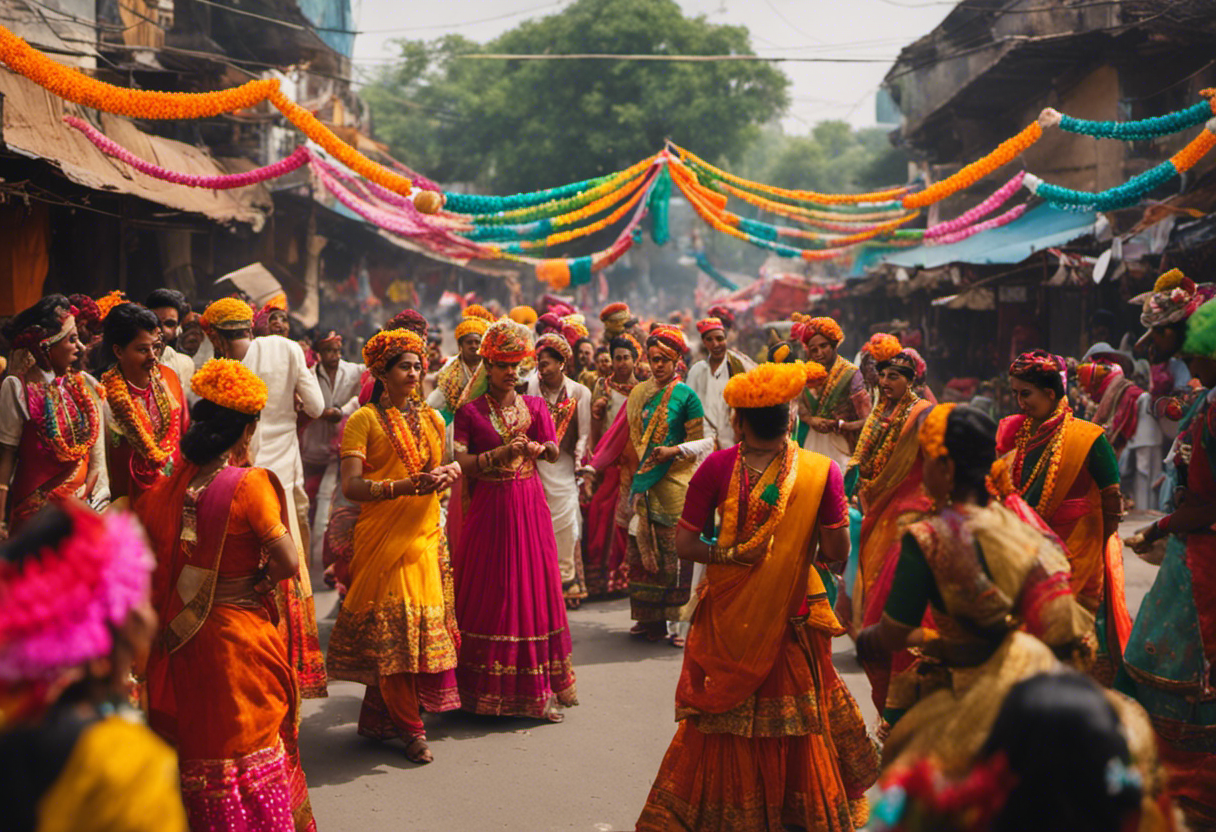

Cultural celebrations and festivities accompany Yugadi in Vikram Samvat, bringing communities together to rejoice in the new year. These celebrations hold immense cultural significance as they not only mark the beginning of a new year but also serve as a time for people to come together and honor their traditions and heritage.
One of the key aspects of the cultural celebrations of Yugadi is the preparation and sharing of traditional meals. Families gather to prepare and savor special dishes that are symbolic of prosperity and good fortune. This act of communal cooking and dining strengthens the bonds within the community and reinforces a sense of unity and togetherness.
In addition to food, music and dance play a vital role in the festivities. Cultural performances, such as traditional music concerts and dance recitals, are organized to showcase the rich artistic heritage of the region. These performances not only entertain the audience but also serve as a means of preserving and passing on cultural traditions to future generations.
Furthermore, community celebrations during Yugadi often include religious ceremonies and rituals. People visit temples and offer prayers to seek blessings for a prosperous year ahead. These religious activities provide a sense of spiritual fulfillment and reinforce the cultural and religious identity of the community.
Spiritual Significance of Yugadi in Hinduism


Amidst the vibrant cultural celebrations, Yugadi holds a deep spiritual significance for Hindus, embodying a time of reflection, renewal, and devotion. This auspicious occasion marks the beginning of a new year in the Hindu calendar, but it also serves as a reminder of the spiritual awakening and divine connection that Hindus strive for.
To understand the spiritual significance of Yugadi in Hinduism, it is important to delve into the beliefs and practices associated with this festival. Here are four key aspects that highlight its spiritual essence:
- Reflection: Yugadi is a time for introspection and self-evaluation. Hindus reflect on their actions and deeds of the past year, seeking to rectify any mistakes and strive for personal growth.
- Renewal: It is believed that Yugadi brings a fresh start and an opportunity for spiritual renewal. Hindus engage in purification rituals, such as taking a holy bath or visiting temples, to cleanse their minds and bodies.
- Devotion: Yugadi is a time for heightened devotion and prayer. Hindus offer prayers and seek blessings from the divine, reaffirming their commitment to leading a righteous and virtuous life.
- Divine Connection: This festival emphasizes the connection between individuals and the divine. It is an occasion to deepen one’s relationship with God, fostering a stronger spiritual bond.
Impact of Yugadi on Personal Growth and Renewal


To fully grasp the transformative potential of Yugadi, it is essential to recognize the profound impact it has on personal growth and renewal. The celebration of Yugadi, the Hindu New Year, provides individuals with an opportunity for self-reflection and new beginnings.
Yugadi marks the beginning of a new lunar cycle and symbolizes the dawn of a fresh start. It is a time when people engage in deep introspection, evaluating their past actions and setting new goals for the future. Through self-reflection, individuals can identify areas for improvement and make necessary changes to facilitate personal growth.
The concept of new beginnings associated with Yugadi encourages individuals to leave behind old habits, negative emotions, and past mistakes. It offers a chance to start afresh, cultivating positive attitudes and behaviors. This process of renewal allows individuals to shed their old selves and embrace a new and improved version.
The practice of self-reflection during Yugadi is supported by various rituals and traditions. One such ritual is the recitation of mantras and prayers, which helps individuals focus their thoughts and invoke positive energy. Additionally, the exchange of sweets and gifts during Yugadi symbolizes the sharing of happiness and prosperity, further reinforcing the idea of new beginnings and personal growth.
Conclusion
In conclusion, Yugadi holds great significance in Vikram Samvat as it marks the beginning of a new year and is celebrated with symbolic rituals and cultural festivities.
The spiritual aspect of Yugadi in Hinduism emphasizes personal growth and renewal.
Its historical origins and cultural traditions contribute to its rich and diverse celebrations.
Overall, Yugadi in Vikram Samvat is a time for reflection, renewal, and celebration, bringing people together in the spirit of joy and hope for the future.

